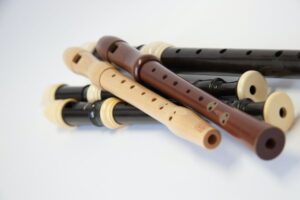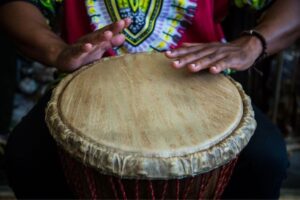Different categories of behaviors and items are considered haram in Islam. From worshiping idols or other deities to consuming pork. These are strictly forbidden.

However, there’s still controversy about whether the use of instruments or music is acceptable or haram. Islam and music have long had a complicated relationship.
Let’s find out what the consensus is on the use of instruments in Islam.
Contents
Haram in Islam
In Islam, the term “haram” refers to actions, behaviors, or things that are considered forbidden or prohibited. Haram acts are considered sinful and are to be avoided by Muslims.
The concept of haram is intended to guide Muslims in leading righteous and moral life.
The prohibitions are seen as a means of protecting individuals and society from harm and promoting justice. It is also a means of strengthening the relationship with Allah.
Is the Use of Instruments or Music Haram?
The topic of music in Islam is a subject of debate among scholars. There are differing opinions regarding its permissibility. Some scholars consider all forms of music to be haram.
Their views are based on their interpretation of certain hadiths and their understanding of the Quranic principles.
These scholars argue that music is inherently distracting. Therefore, it can lead to sinful behavior and may divert a person’s attention away from the remembrance of Allah.
Also, they associate certain negative cultural and moral implications with music.
The Quran
It should be noted The Qur’an makes no specific mention of music or specific instruments that are haram.
However, some academics have understood the phrase “idle talk,” which is forbidden in the Quran, to include music.
On the other hand, other scholars take a more permissive view.
They allow for certain types of music that are considered culturally appropriate and do not involve sinful or immoral content.
These scholars argue that music can have positive effects, such as providing relaxation, cultural expression, and enjoyment.
This is as long as it does not lead to disobedience to Allah. To top it off, they highlight the lack of explicit prohibition in the Quran.
Besides, there is the fact that certain forms of musical expression were present in the time of the Prophet Muhammad. Therefore instruments were not explicitly condemned.
The Hadiths
There are indeed hadiths that unfavorably mention music. One writes that “Singing sprouts hypocrisy in the heart as rain sprouts plants.”
This is often cited in discussions about the permissibility of music. The authenticity and interpretation of this hadith are disputed among scholars.
Some scholars consider it weak or of questionable authenticity. Others may interpret it in a more limited context, referring specifically to certain types of music or situations
Another hadith states: “There will be among my Ummah people who will regard as permissible adultery, silk, alcohol, and musical instruments.”
Ibn Hazm al-Dhahir, a notable Islamic scholar, questioned the reliability of this hadith. He held the opinion that music is permissible.
What Instruments Are Considered Haram?

In Islam, there is no specific list of instruments that are considered inherently haram or forbidden.
Therefore, It is difficult to provide an exhaustive list of specific instruments that are universally considered prohibited in Islam.
The permissibility of musical instruments is still a subject of scholarly debate and interpretation within the Islamic tradition. There is no consensus on which ones are haram.
Common musical instruments like the drum, flute, oud, and others are widely used in various Islamic cultures without controversy.
European instruments like the guitar, lutes, and bagpipes are of Muslim origins.
However, some scholars may hold reservations about instruments that are associated with music styles or cultural practices that are considered inappropriate or immoral.
Instruments have been mentioned or associated with sinful activities in certain cultural contexts.
Instruments Associated with Un-Islamic Rituals
Instruments used in rituals that involve polytheistic or idolatrous practices. This includes certain drums or bells in this context that may be considered prohibited.
Instruments Used in Immoral or Indecent Contexts
Instruments that are commonly associated with immoral or indecent performances, such as those used in some forms of explicit or lewd entertainment, may be viewed as prohibited.
Scholars who permit music often distinguish different types of music. Vocal music or instrumental music without explicit prohibited content may be more readily accepted.
However, music with explicit sexual or immoral themes is generally considered prohibited.
Instruments Used in Prohibited Celebrations
Instruments used in celebrations or gatherings that involve activities forbidden in Islam, such as excessive drinking, gambling, or indecency, may be deemed prohibited.
This can vary depending on cultural practices and specific contexts.
Is It Haram to Play Instruments?
Common musical instruments like the drum, flute, oud, and others are widely used in various Islamic cultures without controversy.
However, some scholars may express reservations about instruments associated with music styles or cultural practices that are considered inappropriate or immoral.
There are indeed some scholars and groups within the Salafi, Wahhabi, and Deobandi traditions that hold a stricter view on music.
Not all members of these denominations share the same perspective.
The New York Times writes that Nations like Kashmir, Afghanistan, and Mali have banned music.
This is with the excuse that it fosters lust and induces people to neglect their spiritual responsibilities.
Other Muslim-majority countries have rich musical traditions that are considered permissible within their cultural and religious framework.
Islam also has its own musical heritage and artists in different genres.

Is It Haram to Listen to Instruments or Music as a Muslim?
Listening to instruments is also a major sin to some scholars. Faql ibn Sha’qan quotes Imam ‘Ali ibn Musa ar-Rida as saying that music is a major sin. “And to be engrossed in musical instruments is also one of the great sins.”
All Mujtahids agree that producing, selling, and purchasing musical instruments is haram. Also, any income generated from musical activities is equally haram.
Transactions based on these instruments are null and void (btil). It is haram to keep musical instruments in one’s possession; they must be destroyed.
Salafi, Wahhabi, and Deobandi are all conservative Islamic movements.
Some scholars within these movements argue that certain forms of music, particularly those accompanied by explicit or immoral lyrics, are prohibited.
However, it is crucial to recognize that there are diverse opinions within these movements as well. Not all Salafis, Wahhabis, or Deobandis hold a strict prohibition on music.
Many followers of these movements enjoy various forms of music that are deemed permissible by their respective scholars.
These include traditional nasheeds (Islamic songs) or instrumental music. This is because they are not considered to incite immorality or distraction from religious duties.
Some scholars suggest that the permissibility of music is a matter of personal discretion.
They however emphasize the need for moderation and avoiding excessive attachment to worldly entertainment. It would appear that music is permissible as long as it honors Allah.
Bottomline
The permissibility or otherwise of instruments is not a universally agreed-upon matter within the Islamic tradition.
As a Muslim, it is not rare to be uncertain about the permissibility of specific instruments or musical practices.
Opinions on this issue vary. Individual beliefs and cultural context also play a role in shaping personal views on the permissibility of music in Islam.
On this note, you are encouraged to seek guidance from knowledgeable and trusted scholars. This way, you can make efforts to avoid haram actions and behaviors.






